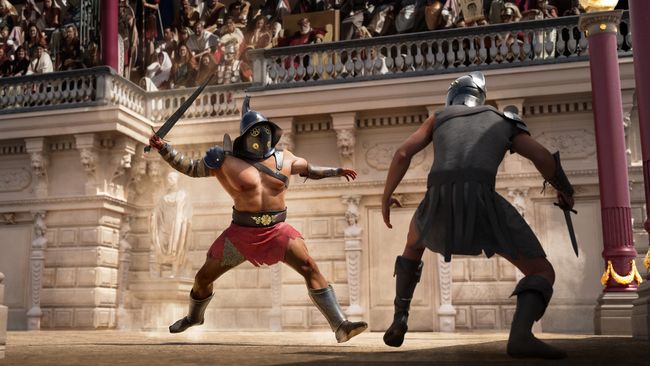Welcome to DU!
The truly grassroots left-of-center political community where regular people, not algorithms, drive the discussions and set the standards.
Join the community:
Create a free account
Support DU (and get rid of ads!):
Become a Star Member
Latest Breaking News
Editorials & Other Articles
General Discussion
The DU Lounge
All Forums
Issue Forums
Culture Forums
Alliance Forums
Region Forums
Support Forums
Help & Search
Anthropology
Related: About this forumDid Roman gladiators really fight to the death?
Being a Roman gladiator was a bloody business, but did all gladiators really fight to the death?
Gladiator fights in ancient Rome were brutal, but did these fighters usually die in the arena? (Image credit: peepo via Getty Images)
Popular media, such as the 2000 film "Gladiator," often depict Roman gladiators in gory battles that don't end until at least one of the fighters is slain. But in real life, did gladiators really fight to the death? In fact, sometimes they did, but not always, experts told Live Science. Alfonso Manas, a researcher at the University of California, Berkeley who has studied gladiators extensively, said evidence indicates that the mortality rate of gladiators varied considerably over time. For instance, tomb paintings dating to the fourth century B.C. at the site of Paestum a Greek city in Italy that eventually came under Roman rule, show that the "gladiators are receiving terrible wounds," such as spears getting stuck in their opponent's head, that would have been fatal, Manas told Live Science in an email. This suggests that many early gladiator fights ended in the death of one or both fighters.
Gladiator games were reformed after 27 B.C., causing the death rate to decrease, Manas noted. These reforms happened during the reigns of Emperor Augustus (circa 30 B.C. to A.D. 14) and Tiberius (circa 14 to 37) . "In the 1st century A.D. we know [the] death rate perfectly: the study of the results of gladiator fights painted on the walls of Pompeii say that out of 5 fights, one ended with the death of the loser," Manas said, adding that this death rate probably remained similar during the second century A.D. Although many gladiators were slaves, with the drop in mortality, some free individuals volunteered to become gladiators, Manas added.
We don't know the specific rules that changed after 27 B.C. However, evidence does indicate that a gladiator could surrender by dropping their shield and extending their index finger, Manas said. Additionally, there was a "summa rudis" — a referee — who could enforce rules and stop the fight if a gladiator was on the verge of being killed. If the person holding gladiator fights granted it, the loser would be allowed to leave the arena without further harm. If the person hosting the event insisted on the gladiator being killed, they would have to pay a large sum to the person who provided the gladiators.
"Gladiators could be rented from their owners by magistrates who wanted to put on games, and there is some evidence of these contracts that shows that if a gladiator was returned severely injured — or killed outright — the lease of the gladiator would be converted to a sale [and] the price could increase by something like 50 times the original contract cost," Virginia Campbell, a lecturer of classical studies at The Open University, told Live Science in an email.
https://www.livescience.com/archaeology/romans/did-roman-gladiators-really-fight-to-the-death
2 replies
 = new reply since forum marked as read
Highlight:
NoneDon't highlight anything
5 newestHighlight 5 most recent replies
= new reply since forum marked as read
Highlight:
NoneDon't highlight anything
5 newestHighlight 5 most recent replies
Did Roman gladiators really fight to the death? (Original Post)
Bayard
Sep 2024
OP
underpants
(187,778 posts)1. Interesting
but frankly not nearly as entertaining ![]()
Wonder Why
(4,821 posts)2. They're all dead, aren't they? 😁😁